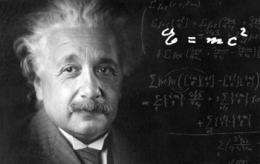Einstein's archive now available online

(PhysOrg.com) -- If you ever wanted to glimpse into Albert Einstein's thoughts, now you can. Last week, the complete catalog of about 80,000 documents written by or addressed to Einstein—letters, postcards, notebooks, and other papers—was made available online by the Hebrew University of Jerusalem and the Einstein Papers Project (EPP) at Caltech.
The archive is the result of more than two decades of collecting and researching. Einstein left a collection of 40,000 personal papers when he died in 1955; since 1986, 40,000 more documents have been collected—most of them by the EPP staff—says Diana Kormos-Buchwald, professor of history at Caltech and director of the EPP.
One of the archive's highlights is a handwritten manuscript for a 1946 article entitled "E=mc²: On the Most Urgent Problem of Our Time," which was published in the magazine Science Illustrated. Explaining general relativity to a lay reader, the manuscript is one of only three documents in the world containing the famed "E=mc2" formula in Einstein's own handwriting.
The collection includes personal correspondence such as a postcard Einstein wrote to his mother, Pauline, whose health had been declining. "How I would like to keep you company again so that you're not left to ugly brooding," he wrote. "I truly wish you good days." In his missive, dated September 27, 1919, Einstein tells her of the "good news" that an expedition in West Africa, led by astronomer Arthur Eddington, had observed the bending of starlight by the sun during a solar eclipse; this effect was one of the main predictions of Einstein's theory of general relativity.
While many are automatically drawn to these personal letters—especially those to his lovers—Kormos-Buchwald says that some of the most exciting items in the archive are Einstein's notebooks, which illuminate the thought process of history's most iconic genius.
One of the most important notebooks, she says, is the so-called Zurich notebook, written during the winter of 1912–1913 and containing notes and calculations that provide a view into how Einstein developed his revolutionary theory of general relativity, which he finished in 1915.
Another notebook, from 1918–1919, contains Einstein's lecture notes on special relativity. On one page, dated November 9, 1918—the day Kaiser Wilhelm II abdicated the throne—Einstein scribbled, "[Lecture] cancelled due to revolution." Also available is Einstein's high-school report card, showing that he earned good grades, despite the popular myth that he was a bad student.
Einstein's letters to his colleagues, including Niels Bohr and Erwin Schrödinger, provide a historical window to the scientific process and show that Einstein was not a lonesome theorist isolated from others. "It's a testament to the very intense scientific exchanges that took place," says Kormos-Buchwald. Einstein would sometimes receive up to 20 letters a day and respond to all of them, a rapid exchange equivalent to today's email conversations. "It gives a much more realistic feeling of what it meant to be a scientist," she says.
Since being launched on March 19, the website has received more than 21 million hits and almost 700,000 unique visitors, Kormos-Buchwald says. The archive includes data on each individual document, such as the title, author, and date. To provide historical context, the EPP has produced scholarly annotations and translations for some 1,000 records. The database of 80,000 records constitutes a level of detail not available for any other archival holdings—and certainly not for any other scientist—she says.
Users can request copies of documents they find interesting; high-quality images of 2,000 documents are now available, and the remainder of the archive will eventually be scanned and made available to the public. Previously an important resource for scholars and historians, the searchable database is now a research tool for everyone, Kormos-Buchwald says. "Everything that we know," she says, "everybody else can know now."
The archive is available at www.alberteinstein.info . To view selected documents, including the ones described here, visit www.alberteinstein.info/gallery/index.html .
Provided by California Institute of Technology


















